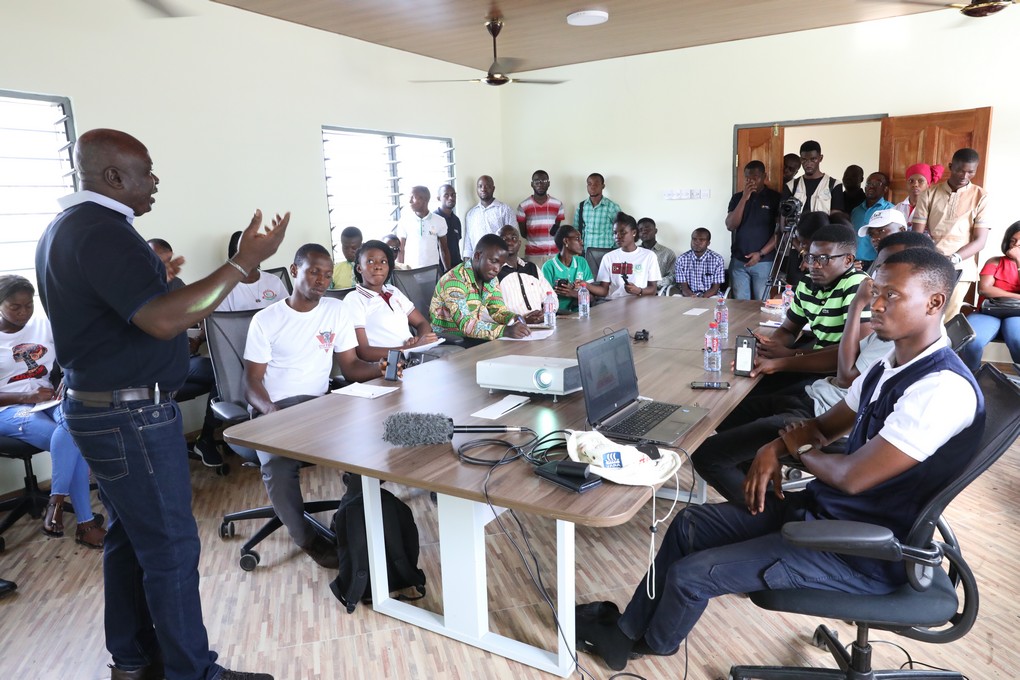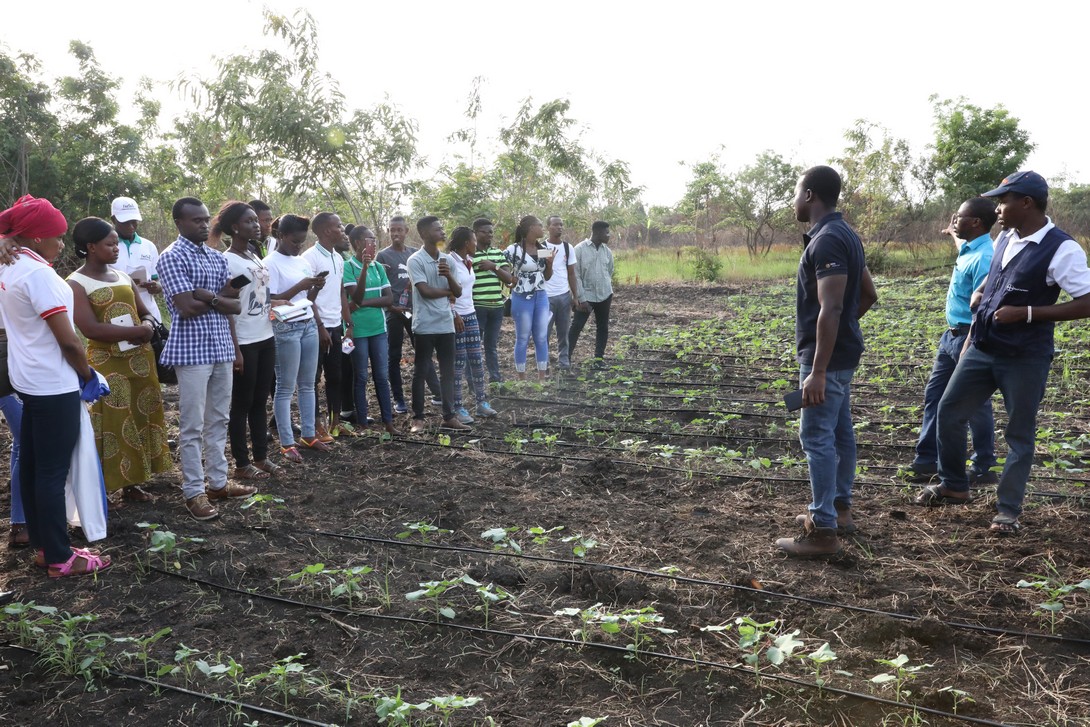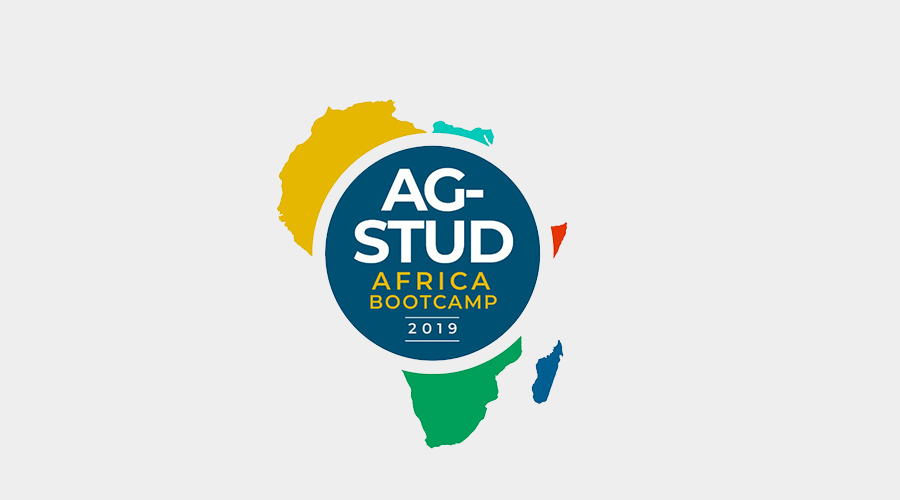
by Bismark | Mar 22, 2019 | Article
WOFAGRIC is Agrihouse Foundation’s expert opinion sharing, mentoring, networking and learning platform for women in agriculture, agribusiness, key stakeholders, development partners, researchers, farmer groups, government agencies, business, civil society, investment and professional advisors and corporate leaders.
WOFAGRIC forms part of efforts to empower women, promote their works, expand their horizon, recognize and award their works and further mentor and inspire other women to venture into Agribusiness.
This year’s event, themed,” Women, Key Partners in Shading Agribusiness” will hold in Ho- Volta Region on the 12th and 13th of June, 2019. The event is being organized in collaboration with the Ministry of Food and Agriculture, Ministry of Gender, Children and Social Protection, Women in Food and Agriculture Development, COCOSHE, Peasant Farmers Association, National Farmers and Fishermen Award Winners Association and the Volta Regional arm of the Ghana National Farmers and Fishermen Association.
The two day event would be climaxed with the Gold in the Soil Awards to distinguish and award women for their invaluable contribution towards Agriculture and Agribusiness
EXPLORING THE THEME: “Women! Key Partners in Shaping Agribusiness.
What does the future hold for the backbone of the economy and the sub-regional basket? What impact are women having in shaping and directing the conversation on production, processing, communications, marketing? Are there favorable policies? How are farm related components of the rural economy contributing to income generation and employment? What is the Government planning next for women in Agribusiness? How are we contributing to women’s empowerment and agricultural entrepreneurship? Are women very well exposed to the aspects of planning, development and management of businesses in agro-industries? What are the plans and initiatives or donor agencies to support women in agribusiness? What is the way forward? Is it the dawn of a new day? Have or can women take their place in the sector full of opportunities?
Join and support us, as we seek to discuss and find answers to our five (5) main topics:
- How to start and manage and agribusiness
- The essence of marketing and branding in agribusiness
- Support systems and best practices in promoting agribusiness
- How can women use agribusiness to bring solutions to Ghana’s economic, social and environmental challenges
- What factors are necessary for good agricultural production?
The Women in Food and Agric Forum and the Gold in the soil Awards, will bring together over two hundred stakeholders; top achievers from the industry and heavy weight thought leaders alongside inspiring individuals from outside the confines of the Agricultural sector, who aspire in their daily lives to bring about new thinking, share knowledge and learn from industry experts.
The above topics have been carefully selected from leads and recommendations, as well as major issues trending in the agricultural sector.
MAIN ACTIVITIES FOR THE Two (2) DAY EVENT:
- Panel Discussion: Key Issues affecting women in Agribusiness
- Focused Training Programs for female Agri-prinuers
- Breakout Session: Mentorship Dialogue
- Presentation : Career Opportunities for Women in Agribusiness
- Empowerment Talk: Fire in my heart and Grace in My soul
- Mentor-Pair-Up: Aspire to be
- Exhibitions
- Gold in the Soil Awards / Documentary
Background
The agricultural landscape is largely dominated by women who make up almost half the world’s farmers. Most of the small holders, including women in agriculture, have less access to education and finance which makes it more difficult for them to adopt new technologies. Research shows that agriculture productivity in developing countries could increase 20-30 percent, if women are given the same access to resources as men. Apart from poverty-reduction benefits to women in agriculture, improving the productivity of existing agricultural lands is a critical way of addressing deforestation and climate change.
As part of efforts to continuously improve and recognize the effort of women in the Agricultural industry and to bring dynamism into the fore, Agrihouse will be organizing the Women in Food and Agriculture Leadership Conference & Expo (WOFAGRIC) which is aimed at showcasing through exhibitions, the works, products and services of women in Agric. in Ghana and beyond. The event purely focuses on Smallholder Women in Agriculture, whiles building capacity, alongside the 2day event.
Rationale
WOFAGRIC seeks to pay tribute to the efforts and contribution by women, young female ‘agripreneurs’, female students and women with disabilities for their roles toward ensuring food security, poverty alleviation, employment creation and ultimately helping the economy.
Benefits
WOFAGRIC seeks to recognize pioneers and trailblazers; the women who push the boundaries along the value chain. From the days of Adam to Tetteh – Quarshie, men have been considered to be at the forefront of agriculture. Women who have dared to challenge this stereotype have been looked at in a not-so- encouraging light. Though there has been a lot of work to increase visibility of women achievers in all industries, women still need and want to see other women role models.
Identifying exceptional women who others can relate to via women-only awards is a step in providing the much-needed examples currently lacking in many traditional awards. The end goal would be to have a level playing field among the genders but currently, we do not. Women are outnumbered by men in the executive talent pool in almost all industries for a number of cultural bias reasons.
Agrihouse Foundation and her partners believe there need to be a paradigm shift in this regard by projecting women achievers in agribusiness.
It also aims to promote networking among women achievers in agribusiness and propel them to do more collectively.
WOFAGRIC will undertake three (3) main segments as follows:
- WOFAGRIC Exhibitions of improved technologies
The exhibition will bring together all the relevant women actors within the sector with the potential to stimulate increased staple crop productivity among small holder farmers including women. It will focus on Innovation bringing together buyers and sellers of the latest technology of products and services to make your business successful.
- The WOFAGRIC Mentorship Dialogue
The two-day Conference will be organized alongside the two-day exhibition to help build capacity of women farmers, entrepreneurs and women in agriculture.
The Conference is aimed at providing a platform to exchange best practices and share
valuable lessons learnt in handling and overcoming challenges in agribusiness.
The WOFAGRIC conference also seeks to facilitate dialogue between various actors in the Agribusiness space among women. The conference will present the platform to
catalyze actions and refine their interventions in order to better respond to the needs;
Advocate for inclusive value chains and agricultural market systems to support women in agribusiness.
- The WOFAGRIC Awards ( Gold in the Soil Awards)
Gold in the Soil Awards: The awards sessions aim at recognizing and rewarding outstanding women in Agriculture. A documentary on activities and impact of these women will be produced to be to be aired on TV and social media platforms to showcase the works of these women and an award ceremony, organized to celebrate them
AWARD CATEGORIES FOR THE GOLD IN THE SOIL AWARDS
- Passion for the Farm Awards
The award recognizes those who have achieved excellence in their field or demonstrated an extraordinary contribution to the agribusiness industry.
This category targets awarding women who are farming in their own right or in a partnership. These women should have made essential contribution(s) to the success and profitability of the farm dovetailing into creation of jobs and improving the economy of the country.
- She-innovates Award
This category seeks to look out for a woman who looked at the community in relation to the farm, identified challenges and saw immense opportunity through diversification and eventually makes a success story out of that business idea.
Iii. The Super Woman Award
This special category goes to women with disabilities for the roles they play towards ensuring food security, poverty alleviation, job creation and economic growth in the Agric sector.
Iv. Star in Ag Award (Woman Agripreneur Award)
This special recognition goes out to young women with great achievements in the agribusiness industry
- Royal Carla Award (Queen mothers)
Through this award, we identify a traditional leader (Queen mother) whose long-
term and active engagement in helping women get access to farmlands in our
Community has had a significant, positive impact on agribusiness.
vi Diamond in the rough award
A potential agripreneur not seen or recognized but has the capabilities to be
outstanding. Smaller projects/business models started would be evaluated and
vi Poultry and Livestock
This is to a woman with great determination and integrity who has continuously
demonstrated a positive role in poultry and livestock and has an unwavering
commitment to succeed in this sector. They have made a series of significant selfless
contributions with a long-lasting benefit to this sector.
Criteria for Selection
The awards are open to women aged 18 and above from every district in Ghana. There can be direct entries or one could be nominated by friends or family by filling in an application form online or picking a form from the offices of Agrihouse foundation.
Nomination package must include:
- A typed profile, not to exceed 500 words, describing the agricultural work of the nominee and in their community.
- Two nominators, providing letters of recommendation (not to exceed one page each) and contact information.
- The nominee’s contact information.
What Happens Then?
All applications and nominations must be sent in before the closing date of Wednesday 1st May, 2019.
Shortlisted nominations will then be visited by a panel of judges. You must be available to receive a visit from the judging panel during the week commencing (date to be communicated)
Email entries to agrihousefoundation@gmail.com or albertaakosa@outlook.com or submitted at the offices of Agrihouse Foundation.
For full details call: 0244623012 / 0242945108 / 0249980957 /0540386759.
Expected Result and Benefit over the Medium to Long Term
Women role in agriculture has been under estimated and undervalued for a long time. This to an extent has contributed to ladies venturing into other fields such as Management, HR, Science and Technology, entertainment just to mention a few with just a fraction of them taking up careers in agriculture. WOFAGRIC will help put women’s contribution in agriculture at the forefront and showcase their products and services. This will throw more light on their activities which will motivate other women to see role models in these accomplished ‘womenpreneurs’.
The Conference and capacity building component of the program will help small holder women farmers identify untapped potentials in the Agric sector and help them create jobs on their own with assistance from the role models who will serve as mentors.
WOFAGRIC awards will recognize and honor the contribution of accomplished women. This will spur them on to do more and serve as a challenge for others. In the long run, more women would be in the Agric space helping create more employment.
With its consistency, it will continue to play that facilitation role that has largely been missing.
The WOFAGRIC Event will continue to ensure that deliberate attention is focused on women in agribusiness as this will help Ghana achieve and maintain even more growth in the agriculture sector.








